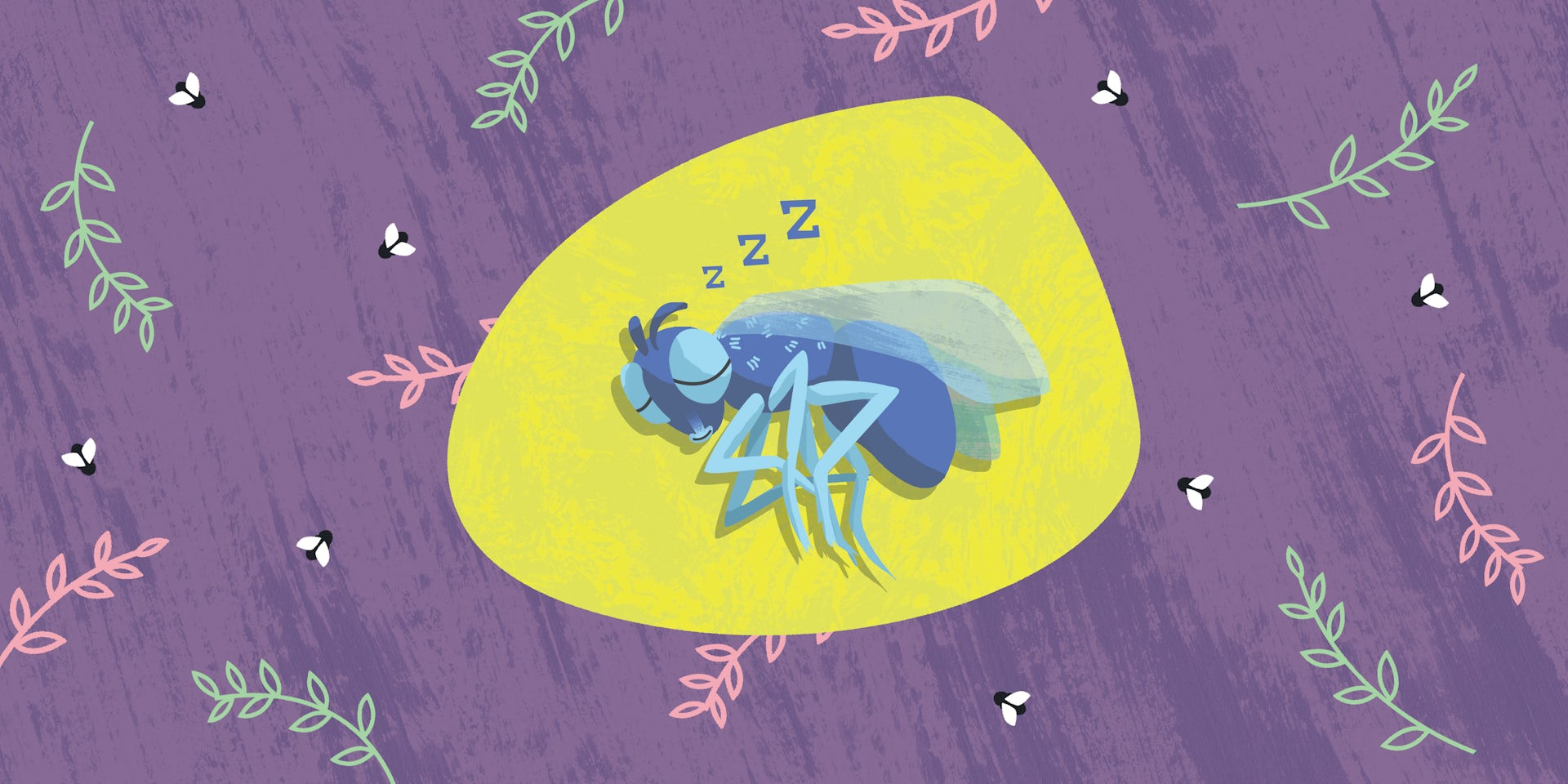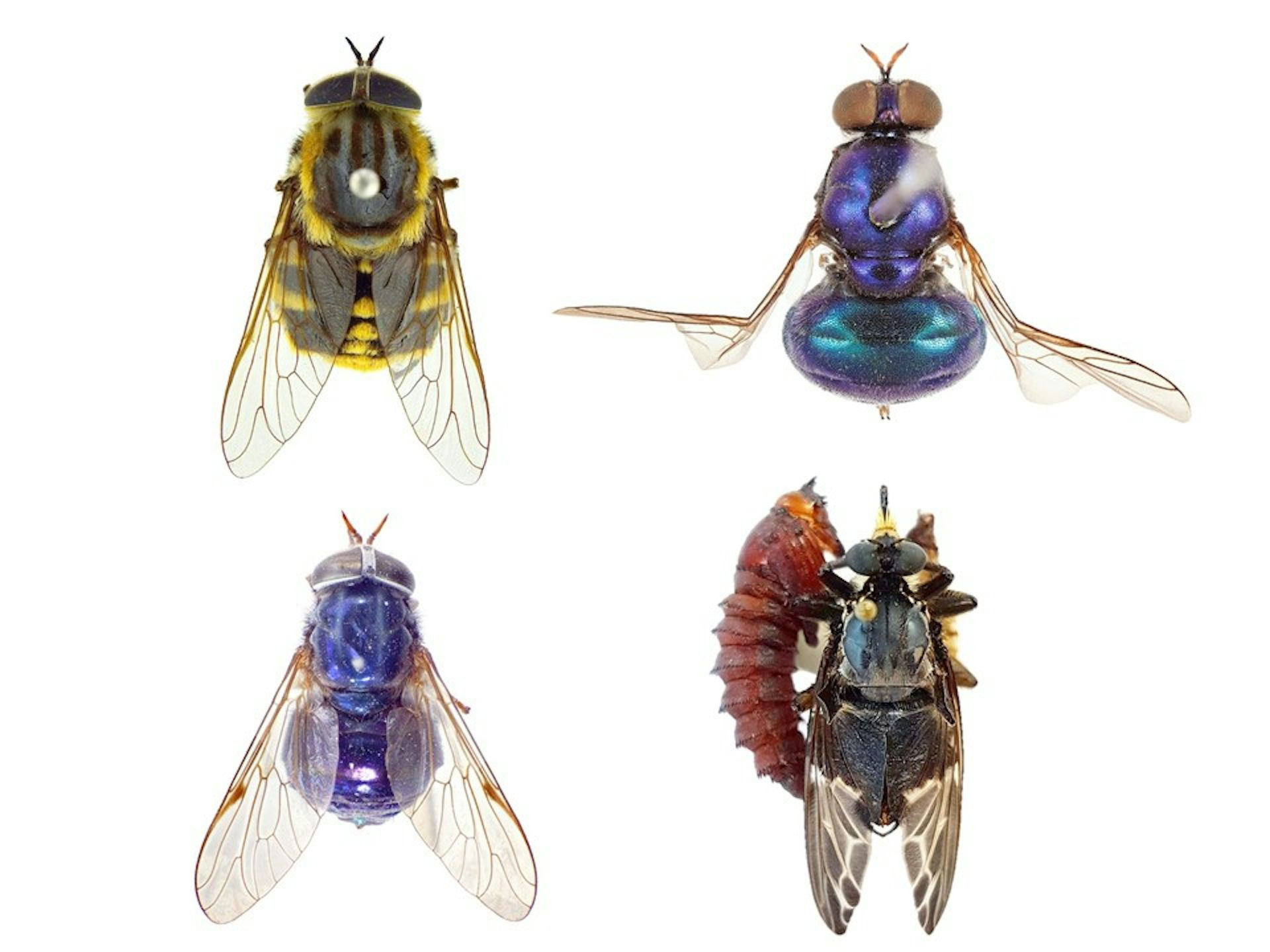Does Flies Sleep? Absolutely, flies do sleep! Just like us, these buzzing insects need their rest. Flyermedia.net explores the fascinating world of insect slumber, revealing where flies catch their Zzz’s, how their sleep cycles work, and why sleep is crucial for their survival. Delve into the biological clock, circadian rhythms, and nocturnal behavior of these tiny aviators, and discover the truth about insect rest, entomology, and diptera sleep.
1. Where Do Flies Sleep and Why Is It Important?
Flies, just like humans and other animals, require sleep to function correctly. Before sunset, they search for safe and sheltered spots to rest, typically on the undersides of leaves, twigs, branches, tall grass, or even under rocks. This careful selection is essential for a few key reasons:
- Protection from the Elements: These locations provide shelter from rain, wind, and cold temperatures, which can be particularly dangerous for cold-blooded insects like flies.
- Predator Avoidance: Sleeping upside down or in concealed locations helps flies avoid predators such as birds, marsupials, and frogs. A fly sleeping on the ground would be an easy target.
- Energy Conservation: Sleep allows flies to conserve energy, which is crucial for their active lives of buzzing around, searching for food, and reproducing.
 A fly resting upside down on a leaf, showcasing its sleeping behavior
A fly resting upside down on a leaf, showcasing its sleeping behavior
2. How Do Flies Sleep? Understanding Insect Sleep Patterns
While we might not think of insects as sleeping in the same way we do, they do experience periods of inactivity and reduced responsiveness that resemble sleep. Scientists have studied fly sleep using various methods, including observing their behavior and monitoring their brain activity. Here’s what we know:
- Periods of Inactivity: Sleeping flies become still and less responsive to stimuli. They might not react to a light touch or a sudden noise.
- Increased Arousal Threshold: Flies that are sleeping require a stronger stimulus to wake up than flies that are awake.
- Sleep Deprivation Effects: Just like humans, flies suffer consequences from sleep deprivation. They exhibit reduced cognitive function, decreased motor skills, and weakened immune systems. According to research from the University of Pennsylvania, sleep deprivation in flies can lead to a 20% reduction in lifespan.
3. Do All Flies Sleep at the Same Time? Exploring Diurnal and Nocturnal Behavior
The sleep schedules of flies vary depending on the species. Most flies are diurnal, meaning they are active during the day and sleep at night, aligning their activity with the availability of sunlight. However, some flies, like mosquitoes, are nocturnal, meaning they are most active at night and sleep during the day.
- Diurnal Flies: These flies have evolved to take advantage of daylight hours for foraging, mating, and other essential activities. They typically find a safe place to rest before sunset and remain inactive throughout the night.
- Nocturnal Flies: Mosquitoes, for example, have adapted to navigate and feed in the dark, using their sensitive eyes and antennae to locate hosts. Female mosquitoes, in particular, are known for their nighttime biting habits, as they require the protein in blood to ripen their eggs. Male mosquitoes are peaceful vegetarians that prefer flower nectar.
4. What Is the Role of Circadian Rhythms in Fly Sleep?
Circadian rhythms are internal biological clocks that regulate various physiological processes, including sleep-wake cycles. These rhythms are influenced by environmental cues, such as light and temperature, and help organisms synchronize their activities with the 24-hour day-night cycle.
- Sleepy Proteins: Flies, like humans, have genes that produce proteins that regulate sleep. When the sun sets, these proteins accumulate in the fly’s eyes, signaling the brain to initiate sleep.
- Light Sensitivity: Sunlight breaks down these sleep-inducing proteins, allowing the fly to wake up and become active.
- Disruptions: Artificial light, such as that from electronic screens, can disrupt these circadian rhythms, making it difficult for flies (and humans) to fall asleep. This phenomenon also occurs when flies are trapped indoors and kept awake by artificial light.
5. Can Flies Experience Jet Lag? The Effects of Time Zone Changes
Since flies have circadian rhythms, they are also susceptible to jet lag, the disruption of the body’s internal clock caused by rapid travel across time zones. Research from the University of Manchester showed that flies exposed to jet lag-like conditions experienced decreased sleep duration and impaired cognitive function.
- Sleep Schedule Disruption: When flies are suddenly exposed to a new light-dark cycle, their internal clock becomes misaligned with the external environment.
- Recovery Time: It takes time for flies to adjust to the new time zone, and during this period, they may experience fatigue, difficulty sleeping, and reduced performance.
- Behavioral Changes: Similar to humans, flies might exhibit changes in their activity levels and feeding patterns during the adjustment period.
6. Do Flies Dream? Exploring the Possibility of Insect Dreams
While we cannot definitively say whether flies dream in the same way humans do, scientists have found evidence that suggests they may experience some form of mental activity during sleep. Studies on fruit flies have shown that they exhibit brain activity patterns during sleep that resemble those seen in mammals during REM sleep, the stage of sleep associated with dreaming.
- Brain Activity: Researchers have identified specific brain regions in flies that are active during sleep and appear to be involved in processing information and consolidating memories.
- Behavioral Observations: Some studies have reported that flies exhibit twitching and other movements during sleep, which could be indicative of some form of mental activity.
- Further Research Needed: More research is needed to fully understand the nature of fly sleep and whether they experience anything akin to dreams.
7. How Does Temperature Affect Fly Sleep? The Role of Cold-Bloodedness
Flies are cold-blooded insects, meaning their body temperature is influenced by the surrounding environment. This has a significant impact on their activity levels and sleep patterns.
- Summer Activity: In warm weather, flies are highly active, buzzing around and engaging in various activities.
- Winter Inactivity: In cold weather, adult flies become too cold to move and often die off. The larvae, however, can survive the winter in a dormant state, waiting for warmer temperatures to emerge as adults.
- Temperature Regulation: Flies can regulate their body temperature to some extent by seeking out warmer or cooler locations, but their activity is ultimately limited by the ambient temperature.
8. What Are the Evolutionary Advantages of Sleep for Flies?
Sleep is a fundamental biological process that serves several essential functions, including energy conservation, tissue repair, and cognitive restoration. For flies, sleep is crucial for:
- Energy Conservation: Sleep allows flies to conserve energy by reducing their metabolic rate and activity levels.
- Immune Function: Studies have shown that sleep deprivation can weaken the immune system in flies, making them more susceptible to infections.
- Memory Consolidation: Sleep may play a role in consolidating memories in flies, helping them learn and adapt to their environment.
9. The Importance of Flies in the Ecosystem: Pollination and More
Flies are often seen as pests, but they play important roles in the ecosystem. One of the most critical roles is pollination.
- Pollination: Flies are important pollinators for many plants, including the cocoa plant, which is responsible for chocolate production. Without flies, we would not have chocolate.
- Decomposition: Flies also help decompose organic matter, breaking down dead plants and animals and returning nutrients to the soil.
- Food Source: Flies serve as a food source for many animals, including birds, reptiles, and amphibians.
10. Where Can You Learn More About Flies and Other Insects? Explore Flyermedia.net!
Are you fascinated by the world of flies and other insects? Flyermedia.net offers a wealth of information about entomology, aviation, and related topics. Discover articles, videos, and resources that will deepen your understanding of these fascinating creatures.
- Aviation News: Stay up-to-date on the latest developments in the aviation industry, including new technologies, regulations, and career opportunities.
- Flight Training: If you’re interested in becoming a pilot, Flyermedia.net provides information on flight schools, certifications, and career paths. Find flight school at 600 S Clyde Morris Blvd, Daytona Beach, FL 32114, United States or call +1 (386) 226-6000
- Insect Facts: Explore the fascinating world of insects, learning about their biology, behavior, and ecological roles.
FAQ: Frequently Asked Questions About Fly Sleep
1. Do flies have eyelids?
No, flies do not have eyelids like humans. Instead, they have compound eyes made up of many individual lenses called ommatidia. These lenses are fixed and do not move or close.
2. How long do flies sleep?
The exact amount of sleep a fly needs varies depending on the species and environmental factors. However, studies have shown that flies typically sleep for several hours each day, often in short naps.
3. Can flies sleep upside down?
Yes, flies can sleep upside down. They have specialized claws and adhesive pads on their feet that allow them to grip surfaces, even when inverted.
4. Do flies snore?
Flies do not have lungs or a respiratory system similar to humans, so they do not snore.
5. Are flies active at night?
Most flies are diurnal, meaning they are active during the day and sleep at night. However, some flies, like mosquitoes, are nocturnal and are active at night.
6. Can flies fly in their sleep?
No, flies cannot fly in their sleep. When they sleep, they become still and inactive.
7. Do baby flies sleep?
Yes, baby flies, also known as larvae, also experience periods of inactivity that resemble sleep.
8. How do flies find a place to sleep?
Flies use a combination of visual and olfactory cues to find a safe and comfortable place to sleep.
9. Do flies sleep in groups?
Some flies may sleep in groups, while others prefer to sleep alone.
10. Is it possible to train flies to sleep?
While it may not be possible to “train” flies to sleep, researchers can manipulate their sleep patterns by controlling their environment and exposure to light and other stimuli.
 Some of Australia’s beautiful flies held at CSIRO’s Australian National Insect Collection in Canberra. CSIRO/Bryan Lessard
Some of Australia’s beautiful flies held at CSIRO’s Australian National Insect Collection in Canberra. CSIRO/Bryan Lessard
Ready to explore the world of aviation and entomology? Visit Flyermedia.net today to discover a wealth of information about flight training, aviation news, insect facts, and more! Don’t miss out on the opportunity to learn about becoming a pilot, discover fascinating insect behavior, and stay informed about the latest trends in the aviation industry. Head over to Flyermedia.net now and take your passion for aviation and entomology to new heights! Address: 600 S Clyde Morris Blvd, Daytona Beach, FL 32114, United States. Phone: +1 (386) 226-6000. Website: flyermedia.net.
